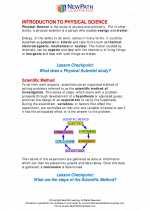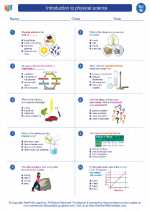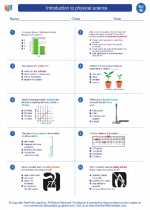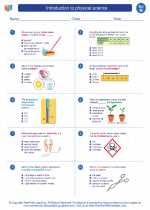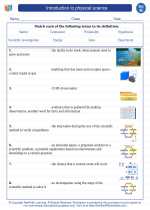Introduction to Physical Science
Physical science is the study of non-living systems and the natural laws that govern them. It encompasses a range of disciplines including physics, chemistry, astronomy, and earth science.
Key Concepts
- Matter and Energy: The fundamental building blocks of the universe, matter and energy are central to physical science. Matter can exist in different states - solid, liquid, gas, and plasma, while energy takes many forms such as kinetic, potential, thermal, and electromagnetic.
- Motion and Forces: Physical science explores the principles of motion, including the concepts of speed, velocity, acceleration, and the laws of motion formulated by Sir Isaac Newton. Forces, such as gravity, friction, and magnetism, also play a key role in understanding the behavior of objects.
- Atoms and Elements: Chemistry is a fundamental component of physical science, focusing on the structure and properties of atoms and elements. The periodic table of elements provides a framework for understanding the properties and behavior of different substances.
- Waves and Electromagnetism: The study of waves and electromagnetism is an important aspect of physical science. Topics include the properties of light, sound, and other forms of electromagnetic radiation, as well as the principles of electricity and magnetism.
- The Universe and Earth: Astronomy and earth science are also part of physical science, exploring the natural processes that shape our planet and the broader universe. This includes topics such as the formation of stars, the structure of the Earth, and the forces that drive geological processes.
Study Guide
To master the concepts of physical science, it is important to engage in active learning and practice. Here are some essential study tips:
- Understand the Basics: Start by familiarizing yourself with the fundamental principles of matter, energy, motion, and forces. Take the time to grasp key definitions and concepts.
- Work Through Problems: Practice solving problems related to motion, forces, and energy. This can help reinforce your understanding of mathematical and conceptual aspects of physical science.
- Explore Experiments: Conduct simple experiments to observe the behavior of matter and energy. This hands-on approach can deepen your understanding of scientific principles.
- Review Atomic Structure: Spend time learning about the structure of atoms, the periodic table, and the properties of elements. Understanding the basics of chemistry is crucial in physical science.
- Study Celestial Bodies: Explore the universe and the Earth through the lens of astronomy and earth science. Learn about the forces that shape our planet and the cosmos.
- Seek Additional Resources: Use textbooks, online resources, and educational videos to supplement your learning. It can provide additional explanations and examples to reinforce your understanding.
